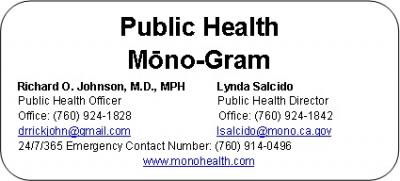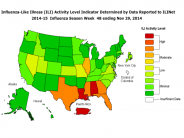Mono-Gram - Influenza update 12/08/2014
Flu Season May Be Severe
It’s time to turn our attention away from Ebola for a moment, and focus on influenza. Two people have died from Ebola so far in the United States, but many thousands are expected to die from influenza infections and complications this winter.
Current Situation
The flu season has begun earlier than last year, with high levels of illness being reported from states in the southeast. Five pediatric deaths have been reported so far. Over 500 hospitalizations have been reported nationally. Southern California is reporting increased flu activity, with an outbreak in a long-term care facility occurring already. Only sporadic activity has been reported in the Eastern Sierra so far.
Two additional facts are cause for concern:
- Influenza A (H3N2) viruses are most common so far (91% of 1,200 specimens tested). Seasons in which this strain predominates are associated with more severe illness and death, especially in older people and young children.
- More than half of the specimens analyzed so far indicate that the virus circulating in the community has mutated. This means that the vaccine will not be as effective as it usually is.
What Should You Do?
- Get your flu vaccination from you healthcare provider, pharmacy, or health department. This is still the single most important thing you can do to prevent serious illness or death from the flu. Getting a vaccine that provides at least partial protection may be more important than ever. Even though there may be decreased protection against the drifted strains, cross protection may reduce the likelihood of severe outcomes such as hospitalization and death. The time to act is NOW, since the vaccine takes effect after 2 weeks. This means you have little time to get vaccinated before seeing grandma or the grandkids during the holiday season. Annual flu vaccination is recommended for all persons aged >6 months, and is particularly important for persons who are at increased risk for severe complications from the flu, including:
a. all children aged 6 months through 5 years of age and persons >64 years of age
b. anyone who has chronic pulmonary, cardiovascular, renal, hepatitis, neurologic, or metabolic disorders
c. persons who have suppressed immune systems due to disease or medication
d. women who are or will be pregnant during the flu season
e. children and adolescents on long-term aspirin therapy
f. residents of nursing homes and other long-term care facilities
g. American Indians/Alaska Natives
h. Persons who are morbidly obese (BMI>39)
- As always, but even more important this year, people at high risk for serious flu complications should see a health care professional promptly if they get flu symptoms, even if they have been vaccinated. There are 2 prescription drugs that can be used to treat the flu or to prevent infection with flu viruses following exposure. Treatment with these antivirals works best when begun within 48 hours of getting sick, but can still be beneficial when given later in the course of the illness. They can make your illness milder and shorter, and can lessen the risk of being hospitalized or dying from the flu. They are effective across all age and risk groups.
- And, of course, take everyday preventive actions to prevent infection with and spread of infections:
a. Cover your coughs and sneezes with your sleeve or elbow
b. Stay away from sick people
c. Stay home from work or school if you are sick
d. Wash your hands often



